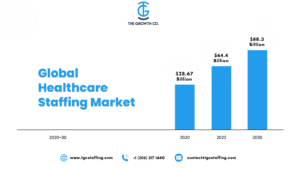In recent years, the healthcare industry in the USA has faced significant challenges in maintaining adequate staffing levels. The increasing demand for healthcare services, with the shortage of qualified professionals, has created a critical gap. Identifying top-tier healthcare professionals is a formidable task. Recruiting independently can be both time-consuming and resource-intensive for organizations. This is why many of them seek assistance from recruitment and healthcare staffing specialists to address their current and future staffing needs more effectively.
The healthcare market in the US has increased exponentially in recent years due to factors such as the pandemic, the aging population, and the growing demand for healthcare services. The greatest demographic waste is the need for more opportunities for nurses and other healthcare services. This newsletter delves into the challenges posed by heightened demand and limited supply in healthcare staffing while exploring how recruiters can seize the opportunity presented by these challenges. Staffing agencies have emerged as a vital solution, helping to bridge this gap by connecting healthcare facilities with the skilled professionals they need. This blog explores how Staffing agencies are addressing these challenges, the benefits they offer, and their impact on the healthcare system.
The Healthcare Staffing Market Landscape
The Healthcare staffing market is a dynamic and rapidly evolving sector driven by the increasing demand for healthcare services and the persistent shortage of qualified professionals. According to market research, the global healthcare staffing market has seen exponential growth from over $28 billion in 2020 to $64.4 Billion in 2022 and is expected to grow significantly in the coming years.
Several factors influence this growth, including the aging population, rising chronic disease prevalence, and advancements in medical technology. The COVID-19 pandemic has also highlighted the critical need for flexible and responsive staffing solutions to address surges in patient volumes and public health emergencies.
In the USA, the market is characterized by a high demand for various healthcare professionals, including nurses, physicians, allied health professionals, and administrative staff. Healthcare facilities, from large hospitals to small clinics, rely on staffing agencies to meet their staffing needs and maintain high standards of care. As the industry continues to adapt to changing healthcare demands, the role of staffing agencies becomes increasingly crucial in ensuring that healthcare facilities have access to the skilled professionals they need.

The Growing Demand for Healthcare Services
Several factors contribute to the growing demand for healthcare services in the USA:
Aging Population:
The aging population is one of the primary drivers of increased healthcare demand. As the baby boomer generation ages, there is a higher incidence of chronic conditions requiring medical attention.
Chronic Diseases:
The prevalence of chronic diseases such as diabetes, heart disease, and obesity necessitates ongoing medical care, further straining the healthcare system.
Technological Advancements:
Advancements in medical technology have led to new treatments and procedures, increasing the need for specialized healthcare professionals.
The Shortage of Healthcare Professionals
Despite the growing demand, the supply of healthcare professionals has yet to keep pace. Several factors contribute to this shortage:
Education and training:
The rigorous education and training requirements for healthcare professionals limit the number of individuals entering the field. Nursing programs, for example, often have long waiting lists due to a need for more faculty and clinical placement sites.
Burnout and Job Dissatisfaction:
High stress levels, long working hours, and job dissatisfaction contribute to burnout among healthcare workers, leading many to leave the profession.
Geographical Disparities:
Rural and underserved areas often face more significant challenges in attracting and retaining healthcare professionals.
The Role of Healthcare Staffing Agencies
Staffing Agencies like TGC Staffing is crucial in addressing the healthcare staffing shortage. We act as intermediaries, connecting healthcare facilities with qualified professionals on a temporary, permanent, or travel basis.
Here’s how TGC Staffing and other staffing agencies are bridging the gap:
Recruitment and Placement: Staffing agencies specialize in recruiting and placing healthcare professionals. They maintain extensive databases of candidates, which enables them to match healthcare facilities with suitable candidates quickly.
Flexible Staffing Solutions: Staffing agencies offer flexible staffing solutions, including temporary, permanent, and travel assignments. This flexibility allows healthcare facilities to adjust their staffing levels based on fluctuating demand.
Specialized Expertise: Staffing agencies specializing in healthcare staffing provide expertise in navigating the complex regulatory environment and understanding the specific needs of healthcare facilities.
Credentialing and Compliance: Staffing agencies handle credentialing and compliance, ensuring that candidates meet all necessary qualifications and certifications. This reduces the administrative burden on healthcare facilities and ensures only qualified professionals are placed.
Benefits of Using Staffing Agencies
Healthcare facilities and professionals benefit from the services the Staffing Agencies provide. Here are some of the key advantages:
For Healthcare Facilities
- Time and Cost Savings: A Staffing Agency streamlines the hiring process, saving healthcare facilities time and money. They handle recruitment, screening, credentialing, and placement, allowing facilities to focus on patient care.
- Access to a Larger Talent Pool: Their extensive databases of healthcare professionals provide access to a larger talent pool than facilities might have on their own.
- Reduced Overtime and Burnout: By providing temporary and flexible staffing solutions, they help reduce the need for overtime, decrease burnout, and improve job satisfaction among existing staff.
- Improved Patient Care: Adequate staffing levels are essential for high-quality patient care. A Staffing Agency ensures facilities have the right number of skilled professionals to meet patient needs.
For Healthcare Professionals
- Career Flexibility: A Staffing Agency allows healthcare professionals to choose assignments that fit their lifestyle and career goals. This flexibility leads to better job satisfaction and work-life balance.
- Professional Development: Temporary and travel assignments allow healthcare professionals to gain diverse experiences and expand their skills, enhancing their resumes and career prospects.
- Competitive Compensation: Staffing agencies often offer competitive compensation packages, including benefits such as housing stipends and travel reimbursements for travel assignments.
- Support and Resources: Staffing agencies also provide support and resources to healthcare professionals, including assistance with licensure, credentialing, and continuing education opportunities.
Impact of Staffing Agencies on the Healthcare System
The involvement of Staffing agencies has a significant effect on the overall healthcare system. Here are some ways in which we contribute positively:
- Addressing Workforce Shortages: By providing flexible staffing solutions, staffing agencies help address workforce shortages in both urban and rural areas. This ensures that healthcare facilities maintain adequate staffing levels and continue providing quality care.
- Enhancing Workforce Mobility: Travel assignments offered by staffing agencies enhance workforce mobility, allowing healthcare professionals to work in different locations and fill gaps where needed. This mobility is particularly crucial during public health emergencies or seasonal demand fluctuations.
- Promoting Quality of Care: Adequate staffing levels are directly linked to the quality of care provided. By helping facilities maintain optimal staffing levels, staffing agencies contribute to improved patient outcomes and overall healthcare quality.
- Supporting Public Health Initiatives: The staffing agency supports public health initiatives by providing surge staffing during outbreaks, natural disasters, or other public health emergencies. Our ability to mobilize healthcare professionals quickly is invaluable in such situations.
Challenges and Considerations
While Staffing Agencies offer numerous benefits, there are also challenges and considerations to keep in mind:
- Cost: While their services can save facilities money in the long run, the initial cost of using a staffing agency can be higher than traditional hiring methods. Facilities need to weigh the benefits against the costs.
- Integration and Orientation: Temporary staff may require time to integrate into the facility’s culture and processes. Effective orientation and training programs are essential to ensure seamless integration and maintain the quality of care.
- Consistency of Care: Temporary staffing can cause concern about continuity of care. Facilities must ensure that temporary staff are adequately briefed on patient needs and treatment plans to maintain consistency.
- Regulatory Compliance: Navigating complex regulatory requirements, including licensure and credentialing, is critical. Ensuring compliance with these regulations is essential to maintaining high standards of care.
Conclusion
According to research, only 41% of healthcare facilities and employers have a strategy for managing their workforce. With this insight, a healthcare employer needs to know that the workforce is the heart of an organization. With adequate staffing, delivpossiblecient and nurturing healthcare services to patients is impossible.
Staffing Agencies have become indispensable partners in addressing the healthcare staffing shortage in the USA. The ability to provide flexible staffing solutions, recruit and place qualified professionals, and support healthcare facilities and professionals alike makes us a vital component of the healthcare system.
As the demand for healthcare services continues to grow, Staffing agencies will play an increasingly important role in ensuring that healthcare facilities can meet patient needs and provide high-quality care.
In conclusion, the collaboration between healthcare facilities and Staffing agencies is essential for maintaining a robust and responsive healthcare system. By bridging the gap in healthcare staffing, we help ensure that patients receive the care they need when they need it, ultimately contributing to better health outcomes and a stronger healthcare system.


